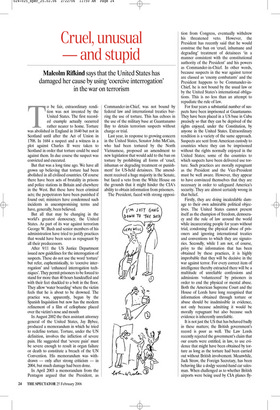Cruel, unusual — and stupid
Malcolm Rifkind says that the United States has damaged her cause by using ‘coercive interrogation’ in the war on terrorism To be fair, extraordinary rendition was not invented by the United States. The first recorded example actually occurred rather nearer to home. Torture was abolished in England in 1640 but not in Scotland until after the Act of Union in 1708. In 1684 a suspect and a witness in a plot against Charles II were taken to Scotland in order that torture could be used against them. In due course the suspect was convicted and executed.
But that was a long time ago. We have all grown up believing that torture had been abolished in all civilised countries. Of course there have been acts of brutality in prisons and police stations in Britain and elsewhere in the West. But these have been criminal acts; the perpetrators have been punished if found out; ministers have condemned such incidents in uncompromising terms and have, generally, been believed.
But all that may be changing in the world’s greatest democracy, the United States. As part of its war against terrorism George W. Bush and senior members of his administration have tried to justify practices that would have been seen as repugnant by all their predecessors.
After 9/11 the US Justice Department issued new guidelines for the interrogation of suspects. These do not use the word ‘torture’ but refer, euphemistically, to ‘coercive interrogation’ and ‘enhanced interrogation techniques’. They permit prisoners to be forced to stand for more than 40 hours handcuffed and with their feet shackled to a bolt in the floor. They allow ‘water boarding’ where the victim feels that he is about to be drowned. The practice was, apparently, begun by the Spanish Inquisition but now has the modern refinement of a film of cellophane placed over the victim’s nose and mouth In August 2002 the then assistant attorney general of the United States, Jay Bybee, produced a memorandum in which he tried to redefine torture. Torture, under the UN definition, involves the infliction of severe pain. He suggested that ‘severe pain’ must be severe enough to result in organ failure or death to constitute a breach of the UN Convention. His memorandum was withdrawn — only after strong criticism — in 2004, but much damage had been done.
In April 2003 a memorandum from the Pentagon argued that the President, as Commander-in-Chief, was not bound by federal law and international treaties barring the use of torture. This has echoes in the use of the military base at Guantanamo Bay to detain terrorism suspects without charge or trial.
Last year, in response to growing concern in the United States, Senator John McCain, who had been tortured by the North Vietnamese, proposed an amendment to new legislation that would add to the ban on torture by prohibiting all forms of ‘cruel, inhuman or degrading treatment or punishment’ for US-held detainees. The amendment received a huge majority in the Senate, but faced a veto from the White House on the grounds that it might hinder the CIA’s ability to obtain information from prisoners.
The President, faced with strong opposi tion from Congress, eventually withdrew his threatened veto. However, the President has recently said that he would construe the ban on ‘cruel, inhumane and degrading’ treatment of detainees ‘in a manner consistent with the constitutional authority of the President’ and his powers as Commander-in-Chief. In other words, because suspects in the war against terror are classed as ‘enemy combatants’ and the President happens to be Commander-inChief, he is not bound by the usual law or by the United States’s international obligations. This is no less than an attempt to repudiate the rule of law.
For four years a substantial number of suspects have been imprisoned at Guantanamo. They have been placed in a US base in Cuba precisely so that they can be deprived of the rights enjoyed, under the Constitution, by anyone in the United States. Extraordinary rendition is a variety of the same approach. Suspects are sent from American custody to countries where they can be imprisoned without the rights normally enjoyed in the United States; some of the countries to which suspects have been delivered use torture. Such practices are morally repugnant as the President and the Vice-President must be well aware. However, they appear to have convinced themselves that they are necessary in order to safeguard America’s security. They are almost certainly wrong in that belief.
Firstly, they are doing incalculable damage to their own admirable political objectives. The United States cannot present itself as the champion of freedom, democracy and the rule of law around the world while incarcerating people for years without trial, condoning the physical abuse of prisoners and ignoring international treaties and conventions to which they are signatories. Secondly, while I am not, of course, privy to the information that has been obtained by these practices, it is highly improbable that they will be decisive in the war against terror. For every correct item of intelligence thereby extracted there will be a multitude of unreliable confessions and admissions ‘volunteered’ by prisoners in order to end the physical or mental abuse. Both the American Supreme Court and the House of Lords have long recognised that information obtained through torture or abuse should be inadmissible in evidence, not only because admitting it would be morally repugnant but also because such evidence is inherently unreliable.
It is not just the US that has behaved badly in these matters; the British government’s record is poor as well. The Law Lords recently rejected the government’s claim that our courts were entitled, in law, to use evidence that might have been obtained by torture as long as the torture had been carried out without British involvement. Meanwhile, Jack Straw, the Foreign Secretary, has been behaving like a dodgy second-hand car salesman. When challenged as to whether British airports were being used by CIA planes fly ing kidnapped prisoners to foreign countries where they could be imprisoned and subjected to possible torture, he began by denying that there had ever been any such requests by the United States.
Subsequently, a leaked memo from the Foreign Office to No. 10 Downing Street revealed that there had been two such requests from the Americans. In fact, there had been four, two of which had been agreed and two turned down. Significantly, all four were before 9/11, and Parliament has been assured that there have been no such requests since then. As the use of extraordinary rendition has increased enormously since 2001, the obvious explanation is that the Americans have used British airports and airspace but have stopped requesting permission and the British authorities have acquisced.
Indeed, the government has defended itself by saying that under British and international law CIA flights are not obliged to provide a passenger list or to obtain permission from the government when re-fuelling at British airports. Such weasel words do not impress. No wonder the foreign affairs select committee accused the government of obfuscation. If he wants to clear the matter up, all that Mr Straw needs to do is ask the United States for an assurance that, from now on, no CIA flights landing or refuelling at British airports will carry kidnapped prisoners.
These are issues which go to the heart of the values of a free society. I have no doubts about the ultimate commitment of the United States to human rights and the rule of law. But there is a growing divergence between rhetoric and policy. The sooner the White House practises what it preaches, the better both for its reputation and for the Western world as a whole.



































































 Previous page
Previous page